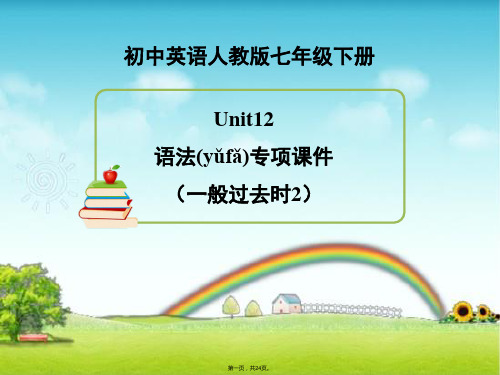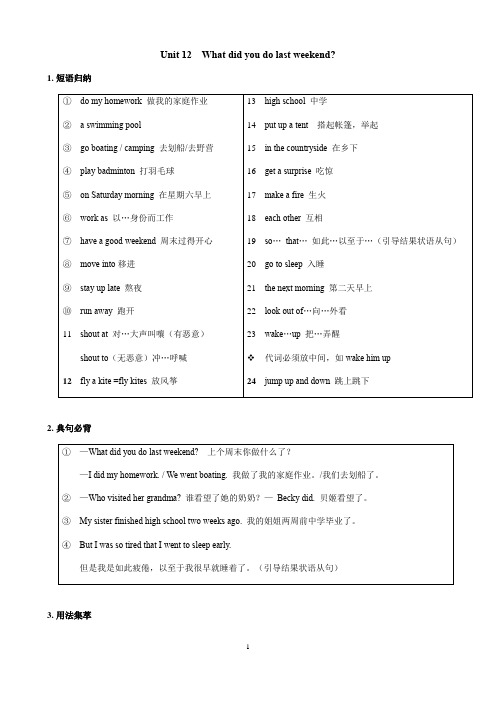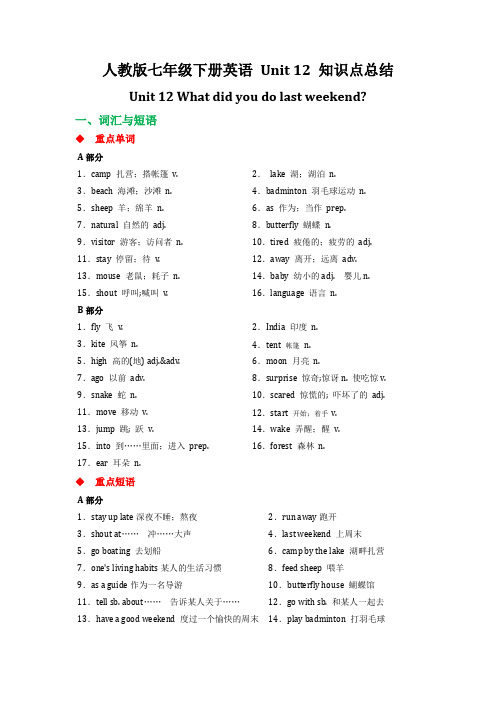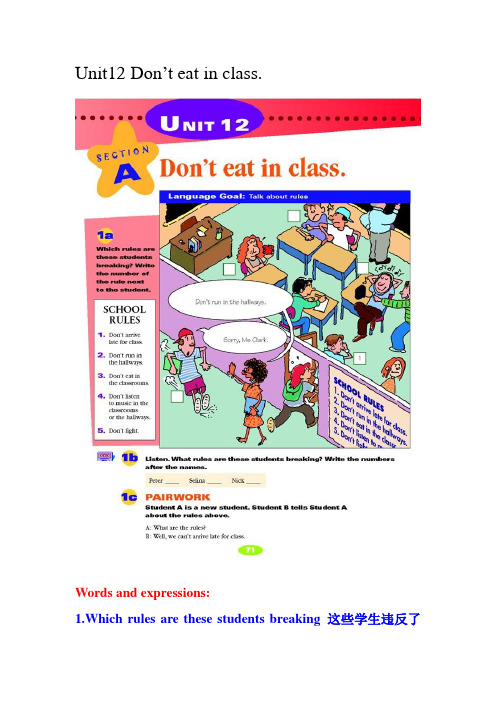人教版英语七年级下册unit12单元语法小专题
人教版英语七年级下册单元Unit 12 知识点+测试卷+思维导图

Unit 12 What did you do last weekend?1.重点词汇:lake, beach, sheep, kite, moon, snake, forest, surprise, pretty, natural, shout, fly, stay, move, jump, wake2. 短语归纳:1.work as 以……身份而工作2.have a good weekend 周末过得愉快3.kind of 有点儿4.stay up late 熬夜5.run away 跑开6.shout at 对……大声叫嚷7.put up 搭起,举起8.in the countryside 在乡下9.get a surprise 吃惊10.make a fire 生火11.each other 互相12.so… that… 如此……以至于……13.look out of… 向……外看14.up and down 上上下下15.wake…up 把……弄醒16.move into… 移进……3. 必背典句:1. —What did you do last weekend? 上个周末你做什么了?—I did my homework. / We went boating. 我做了我的家庭作业。
/我们去划船了。
2. —Who visited her grandma? 谁看望了她的奶奶?—Becky did. 贝姬看望了。
3. My sister finished high school two weeks ago. 我的姐姐两周前中学毕业了。
4. But I was so tired that I went to sleep early. 但是我是如此疲倦,以至于我很早就睡着了。
4.语法知识:1. 一般过去时的几种句型:(1)be动词的一般过去时的句型:①肯定句结构为:主语+was / were+其它。
新人教版英语七年级下册Unit12-语法专项课件(一般过去时2)

No often。2.just now 刚刚。如果谓语之前有did,谓语动词需还原。动词若是was,were,否定
就把not添。-Yes, she was.。-Yes, she did.。go
Image
第二十四页,共24页。
第七页,共24页。
考点大观 易错辨析 通关训练
易错点1 一般过去(guòqù)时陈述句变为特殊疑问句
What did you do the day before yesterday? 前天你们做什么(shén me)了? When did the Green Family arrive? 格林一家什么(shén me)时候到达的?
find—found bring —brought spend—spent teach—taught
第十七页,共24页。
易错点4
实义动词(dòngcí) 需还原
考点大观 易错辨析 通关训练
助动词是照妖镜,后边(hòu bian)动词现原形。
第十八页,共24页。
易错点4
实义动词(dòngcí)需 还原
第九页,共24页。
考点大观 易错辨析 通关训练
易错点1 一般过去(guòqù)时陈述句变为特殊疑问
句
第二步 语序(yǔxù)变化
1) 对主语提问(tíwèn)语序不变 Your friend came to send an email.
Who came to send an email?
第十页,共24页。
考点大观
一般(yībān)过去时标 志词
易错辨析
通关训练
时间状语 1. yesterday 昨天
时间状语 6. this morning 今天早上
2.just now 刚刚 a moment ago刚才
人教版七年级下册英语Unit 12 知识点语法归纳总结

Unit 12 What did you do last weekend?1.短语归纳2.典句必背3.用法集萃(1)What did you do last weekend? 你上周末做了什么?❖last 作形容词时,意为“最后的,最末的”或者“紧接前面的,刚过去的”。
例如:Today is the last day in the year. 今天是今年的最后一天。
I didn’t sleep well last night. 昨晚我没睡好。
❖last作副词时,意为“最后地”,例如:I’m the last one. 我是最后一个。
❖last 做动词时,意思是“持续,继续,维持”等,例如:The hot weather lasted a week. 炎热的天气持续了一周。
(2)How interesting! 多有趣啊!❖本句是how引导的感叹句,how用来修饰形容词或副词,此类感叹句的结构为:“How+形容词/副词( +主语+谓语)!”。
例:How beautiful the girl is! 这个女孩真漂亮啊!How fast the boy is running ! 那个男孩跑得真快啊!❖what也可以引导感叹句,what用来修饰名词。
常见的结构有:(3)I stayed up late to watch the soccer game. 我熬夜到很晚看了足球赛。
❖stay up是固定搭配,意为“熬夜”。
例:She stayed up until 2 :00 am. 她熬夜熬到凌晨两点。
❖常见的“动词+up”结构的短语还有:(4)The cat quickly ran away. 那只猫飞快地逃跑了。
❖run away意为“逃跑;跑开”,其中run意为“跑”,过去式是ran,属于不规则变化。
例:The thief tried to run away, but he failed. 那个小偷试图逃跑,但失败了。
人教版七年级英语下册Unit12SectionA单元语法聚焦十二

单元语法聚焦十二
3. He found the key in his drawer.(对画线部分提问) ___W__he_r_e_ ____d_id___ he ___f_in_d___ the key? 4. She did her homework at school.(改为否定句) She ___d_i_d_n_'t_ ____d_o___ her homework at school. 5. They visited other countries during the holiday.(改为一般疑问句) ____D_i_d__ they ___v_is_it___ other countries during the holiday?
单元语法聚焦十二
( B )5.2016·绵阳—Don't you see the sign “No parking!” on the right? —Sorry, I ________. But now I know parking here is not right. A.don't B.didn't C.hadn't D.doesn't
单元语法聚焦十二
(3)一般疑问句:___D_id____+主语+__动_词__原__形_+其他?肯定回答: Yes, __主_语_____+___d_i_d___.否定回答:No, __主__语____+__d_id_n_'_t __. —Did he go to Guangzhou yesterday? 昨天他去广州了吗? —Yes, he did./No, he didn't.是的,他去了。/不,他没去。 (4)特殊疑问句:特__殊__疑_问__词_+___d_i_d___+主语+_动__词_原__形__+其他? What time did he get to school this morning? 今天上午他是什么时间到学校的?
最全面人教版七年级下册英语第十二单元知识点归纳总结

人教版七年级下册英语Unit 12 知识点总结Unit 12 What did you do last weekend? 一、词汇与短语◆重点单词A部分1.camp 扎营;搭帐篷v.2.lake 湖;湖泊n.3.beach 海滩;沙滩n.4.badminton 羽毛球运动n. 5.sheep 羊;绵羊n.6.as 作为;当作prep. 7.natural 自然的adj.8.butterfly 蝴蝶n.9.visitor 游客;访问者n.10.tired 疲倦的;疲劳的adj. 11.stay 停留;待v.12.away 离开;远离adv. 13.mouse 老鼠;耗子n.14.baby 幼小的adj. 婴儿n. 15.shout 呼叫;喊叫v.16.language 语言n.B部分1.fly 飞v.2.India 印度n.3.kite 风筝n.4.tent 帐篷n.5.high 高的(地) adj.&adv.6.moon 月亮n.7.ago 以前adv.8.surprise 惊奇;惊讶n. 使吃惊v. 9.snake 蛇n.10.scared 惊慌的; 吓坏了的adj. 11.move 移动v.12.start 开始;着手v.13.jump 跳; 跃v.14.wake 弄醒;醒v.15.into 到……里面;进入prep.16.forest 森林n.17.ear 耳朵n.◆重点短语A部分1.stay up late深夜不睡;熬夜2.run away跑开3.shout at……冲……大声4.last weekend 上周末5.go boating 去划船6.camp by the lake 湖畔扎营7.one's living habits某人的生活习惯8.feed sheep 喂羊9.as a guide作为一名导游10.butterfly house 蝴蝶馆11.tell sb. about……告诉某人关于……12.go with sb. 和某人一起去13.have a good weekend 度过一个愉快的周末14.play badminton 打羽毛球B部分1.fly a kite 放风筝2.high school 中学3.put up 搭起;举起4.each other 互相;彼此5.get a surprise 吃惊6.shout to……对……大声喊叫7.up and down 上上下下;起伏8.wake……up 把……弄醒9.a special gift 一件特殊的礼物10.take a long bus ride to 乘长途车去11.put up 搭起;举起12.keep sb. warm 使某人暖和13.on the first night 在第一个夜晚14.tell a story 讲故事15.go to sleep 入睡,睡着16.look out of 朝外看17.read a book about…读关于…的书18.know about 知道关于19.start to do sth. 开始做某事20.jump up and down 跳上跳下21.move into 搬进22.make a fire 生火23.something interesting 有趣的事情24.feel……doing sth. 觉得……正在做某事25.finish high school 高中毕业26.see……doing sth. 看见……正在做某事27.clean one's room 打扫房间28.so……that……如此……以至于……29.on Saturday night 在周六晚上30.have dinner with sb.和某人一起吃晚饭31.stay at home 待在家里32.have a busy weekend度过一个繁忙的周末33.talk show 脱口秀34.study for……为……学习◆重点句子A部分1.—What did you do last weekend? 上个周末你做什么了?—I did my homework. 我做我的家庭作业了。
人教版七年级下册英语Unit12单元语法知识点总结

人教版七年级下册英语Unit12单元语法知识点总结本单元重点短语的具体用法1. Last weekend:用于描述过去的时间,通常在句子中作时间状语。
例如:I went shopping last weekend.(我上周末去购物了。
)2. Do one's homework:表示做作业。
例如:I need to do my homework before going out.(我需要在出去之前做作业。
)3. Go to the cinema:去看电影。
例如:They decided to go to the cinema instead of staying at home.(他们决定去电影院而不是待在家里。
)4. Go boating:去划船。
例如:We went boating on the lake and had a great time.(我们在湖上划船,玩得很开心。
)5. Camp by the lake:在湖边露营。
例如:They camped by the lake and enjoyed the beautiful scenery.(他们在湖边露营,欣赏美丽的风景。
)6. Go to the beach:去海滩。
例如:I like to go to the beach to relax.(我喜欢去海滩放松。
)7. Play badminton:打羽毛球。
例如:They played badminton in the park.(他们在公园里打羽毛球。
)8. On Saturday morning:在周六的早上。
例如:On Saturday morning, I usually sleep in.(在周六的早上,我通常会睡懒觉。
)9. Study for the English test:为英语考试学习。
例如:I have to study for the English test tomorrow.(我必须为明天的英语考试学习。
英语人教版7下十二单元所有语法

What + adj. +复n/不n + (主+ 谓)! What clever monkeys(they are)!
What cold weather! How + adj. /adv.+主+谓! How clever the boy is! How+主+谓+其他! How I miss my mother!
that’s why 那就是为什么; 那就是……的原因
That’s why he didn’t come.
a second language 一门外语;第二语言
English is a useful language. It is often used as a second language.
Jim looked at them in surprise.
to one’s surprise 令某人吃惊的是
To my surprise, his exam results are very good.
surprised adj. 感到惊讶的 修饰人
These stories surprised and moved me.
因为;由于
We all believe him as he is an honest boy.
感叹句
what + a/an + adj. + n + (主+谓)! what a cold day it is! how + adj. + a/an + n + (主+谓)! How cold a day it is!
make a fire生火;点起篝 火
人教版英语七年级下Unit12课本知识梳理及课后习题

Unit12 Don’t eat in class.Words and expressions:1.Which rules are these students breaking 这些学生违反了哪些规定?①这是由疑问词which 引导的特殊疑问句。
Which 在本句中是疑问形容词,它还可以作疑问代词,“哪个,哪些”Which do you like better, classical music or popular musicWhich sport is your favoriteWhich 用作疑问代词时可以独立使用,用作疑问形容词后面须接名词,两种情况经过变化后可以互换使用。
Which hat is your sister’s=Which is your sister’s hat②rule 在句中作名词,“规则,规定”We must obey school rules.常见的词组:obey a rule 遵守规定break a rule 违反规定carry out a rule 执行规定abolish a rule 废除规定③break 是动词,“破坏,违反”,还可以表示“破坏,打破,打碎”。
The boy often breaks school rules.Who broke the window of the classroomBreak 作名词,“休息,中间,中断”。
Let’s take a ten-minute break.2.Don’t arrive late for class.①本句是一个祈使句的否定句。
祈使句是指动词原形开头,表达命令或者乞求的句子。
其否定句是在句首加“Don’t”构成.Don’t listen to mu sic in class.Don’t play basketball in the classroom.Don’t run in the hallways.②区分arrive,get和which.句中的arrive 表示“到达,抵达”,为不及物动词,后面加宾语需加介词at 或in。
- 1、下载文档前请自行甄别文档内容的完整性,平台不提供额外的编辑、内容补充、找答案等附加服务。
- 2、"仅部分预览"的文档,不可在线预览部分如存在完整性等问题,可反馈申请退款(可完整预览的文档不适用该条件!)。
- 3、如文档侵犯您的权益,请联系客服反馈,我们会尽快为您处理(人工客服工作时间:9:00-18:30)。
单元语法小专题(Grammar Focus)
语法精讲
一般过去时(Ⅱ)
一般过去时的特殊疑问句
特殊疑问句是由疑问代词(who,what,which)和疑问副词(where,when,why,how)引导的疑问句。
一般过去时的特殊疑问句有以下几类:
1.疑问词在句中不充当主语时,句型结构为:
(1)疑问词+was/were+主语+其他?如:
How was your weekend?你的周末过得怎么样?
(2)疑问词+did+主语+动词原形+其他?如:
What did you do yesterday?昨天你干了些什么?
Who did you go to the park with?你和谁一起去的公园?
2.疑问词在句中充当主语时,句型结构为:
(1)疑问词+was/were+表语+其他?如:
Who was here just now?刚才谁在这儿了?
(2)疑问词+行为动词的过去式+其他?如:
Who cleaned our classroom yesterday?昨天谁打扫了我们的教室?
【拓展】一般过去时的判断
(1)当句中用到表示过去的时间状语时,用一般过去
时。
这样的状语有
①yesterday构成的相关词组,如:yesterday
morning,at five o'clock yesterday等。
②last构成的相关词组,如:last week,last year,
last Sunday afternoon等。
③用“一段时间+ago”表示“……(多久)以前”,
如:ten years ago,three days ago等。
④表示过去的时间短语。
如:in the 1990s,on May
1st 1892,in the old days等。
(2)根据句意确知某一动作发生在过去,用一般过去
时。
如:
Edison invented many useful things.爱迪生发明了许多有用的东西。
(3)有表示时间、让步或结果状语从句时,一般主句
用过去时,从句也用过去时。
如:
The man drank some water after he got up in the morning.那个男人在早上起床后喝了很多水。
语法精练
Ⅰ.根据答语,用适当的疑问词完成下列对话。
1.—Where did you go last weekend?
—I went to the zoo with my parents.
2.—How was the weather yesterday?
—It was sunny.
3.—What did Tim and his brother do yesterday? —They played soccer in the park.
4.—Who found the lost dog?
—Betty did.
5.—Why did you play badminton with your friends? —Because it was really exciting.
Ⅱ.对下列句子中的画线部分提问,每空一词。
6.Susan washed__her__clothes yesterday afternoon. What did Susan do yesterday afternoon?
7.Bill cleaned the room with Jack this morning. Who cleaned the room with Jack this morning? 8.They went to__the__village last month.
Where did they go last month?
9.Helen joined the club three__weeks__ago.When did Helen join the club?
10.Our school trip was great.
How was your school trip?
Ⅲ.补全对话。
从方框中选出正确的选项补全对话。
A:__11__
B:It was great.We enjoyed ourselves.
A:__12__
B:Well,on Sunday we went to the beach and played volleyball there.
A:__13__
B:I played with Linda.And we went boating on Sunday.
A:Really?__14__
B:On Daming Lake.__15__
A:No,I stayed at home.I had too much homework.
11.B12.D13.E14.C15.A。
